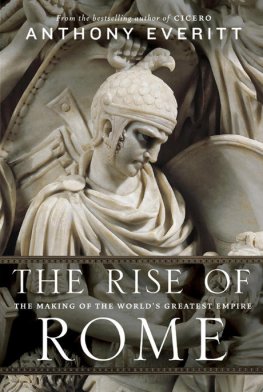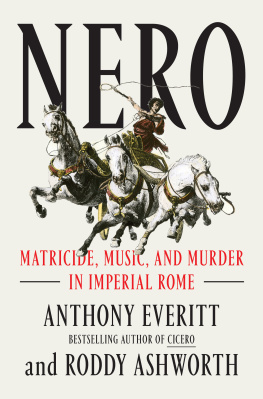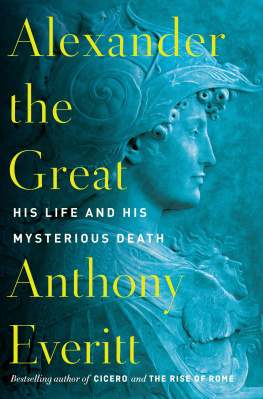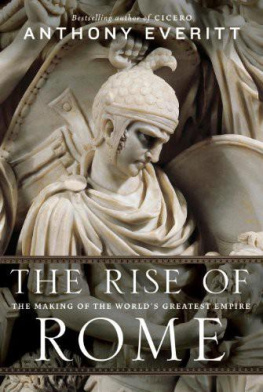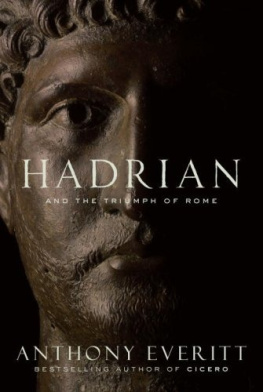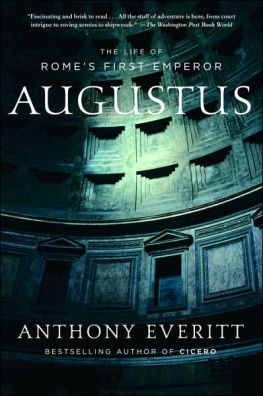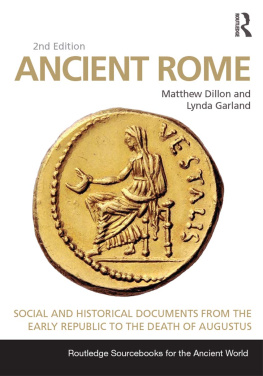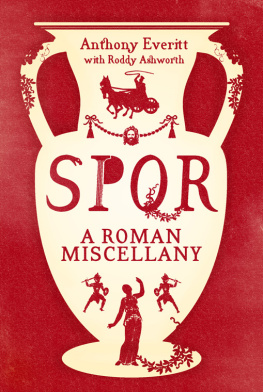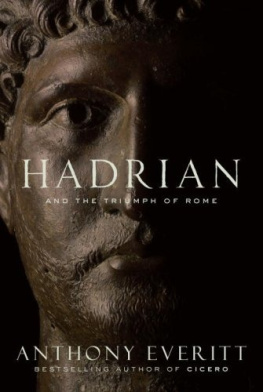Anthony Everitt
THE RISE OF ROME
The Making of the Worlds Greatest Empire
FROM EDWARD GIBBON ONWARD, HISTORIANS HAVE pondered the decline and fall of the Roman Empire. But how was the empire won? What was it that enabled a small Italian market town by a ford on the river Tiber to conquer the known world? I seek to answer these questions by telling the story of the rise of Rome. This is the first time in many years that an account of the Roman Republic has been written for the reader with a general interest in history, and more particularly in the origins of the West. It is a taster of the treasures in store for anyone who wishes to dig deeper into the subject.
THIS REMOTE PAST is worth the trouble of exhuming because the Romans remain relevant to us. They still inspire us, still have an effect on how we view social, political, and moral values. We live in a world they made.
The idea of Rome is imprinted on our genes. It has generated proverbs, maxims, and phrases that we use in our everyday lives with scarcely a thought for their old significance: all roads lead to Rome, the grandeur that was Rome, when in Rome do as the Romans do, Rome wasnt built in a day, Rome the eternal city.
Every few years, Hollywood produces a film that re-creates this vanished civilizationamong them Gladiator, Spartacus, Ben-Hur, and Quo Vadis. We stand in awe of Roman power and ruthlessness. We are frightened, but also enthralled, by their Gamesthe bloodstained entertainments in which gladiators fought one another for the amusement of huge audiences.
The Romans were a practical people fascinated by engineering. They pioneered the art of building long-lasting roads. They showed how living in towns could be comfortable and civilized, even if mainly for the rich.
A community is not just about bricks and mortar. The Romans were practical in another way, for they believed deeply in the rule of law. From their earliest years, they created a legal system, which they went on improving throughout their history. Roman law has influenced the legal systems of many modern European countries and also that of the United States.
Although Latin died out as a living language after the Western Roman Empire came to an end in the fifth century A.D., it has had a long afterlife. Until the 1960s and the Second Vatican Council, the religious services of the Roman Catholic Church were conducted in Latin. Even today, flowers and plants, and medical names for parts of the body and for diseases, are in Latin. The constellations in the night sky are called by Latin names and reflect the heroes and heroines of Greco-Roman legends. The names of many American institutionssuch as Senate, Congress, and Presidentcome from Latin. Courses in Latin are still offered in some high schools and in many colleges and universities. Translations of Romes poets and historians are on sale in American and European bookshops.
The founding fathers of the United States of America were brought up on the classics of Roman literature. They were fascinated by the Roman system of republican government. They liked its balance between three sources of power: kingship (all-powerful Roman consuls); oligarchy, or rule by a few noble families (the Roman Senate); and democracy, or rule by the People (the Roman citizens assemblies, which passed laws). The first Americans imitated this model and designed a three-part government, full of checks and balances, with a President, a Senate and a Chamber of Representatives, and a judicial system.
THE CITYS FOUNDATION myths and the events of its early centuries are almost entirely unhistorical, but they were what Romans believed of themselves. They are a rich and poetic feast that has nourished European civilization for two thousand years. It is only in the past few generations that our collective mind has begun to jettison them. If this book serves any purpose, it is as a reminder of what we are losing.
I reflect on the big themes and analyze the development of Roman politics, warfare, and society. But above all this is history as story, and I seek to bring to life the extraordinary personalities who lived itfrom Tarquin the Proud to Marius, from Coriolanus to Sulla, from Scipio Africanus to the brothers Gracchi. The most charismatic of them all was not even a Roman but the man who came closest to destroying Romethe great, tragic, embittered Hannibal.
One of the curious features of Roman history is that it often suggests parallels between then and now, but such comparisons can be dangerous, and I leave readers to make their own connections unaided.
AN UNQUENCHABLE LEGEND underpins the hopes and ambitions of many of the actors in this long dramathat of the siege and sack of the city of Troy (or Ilium, as Homer had it in his epic poem the Iliad) and the tragic heroism of the Greek warrior Achilles, doomed to die young but glorious. A latter-day Achilles, the astounding Alexander the Great, also blazed a trail that many young Greeks and Romans, from Pyrrhus to Pompey, did their best to emulate. And it was generally agreed that Rome was Troy reborn, ready to avenge itself on the once victorious Greeks. When he invaded Italy, Pyrrhus (also the name of Achilles son), the king of Epirus, believed that he was refighting the Trojan War, and mythical divinities, such as Jupiters wife, Juno, and the demigod Hercules, were deployed by Hannibal as weapons in his propaganda campaign against Rome.
One of my protagonists is the city of Rome itself. Its temples, statues, rituals, and symbols were a visual register of collective memory. The Romans were fascinated by the historical associations of the places, shrines, temples, and statues of their city. Ceremonial customs often included enigmatic allusions to events that took place along ago. Interpreted carefully, the urban landscape was its own history book. The past was reincarnated in the present. The living sensed that they were treading in the footsteps of greater ancestors and that distant happenings had a way of repeating themselves, in a light disguise.
The Romans were fighters and spent much of their time battling with their neighbors in Italy and then with powers beyond the Mediterranean Sea. Politics and warfare were inextricably intertwined in their system of government. Ambitious men had to combine the art of the public speaker at home with that of the general in the field if they meant to attain power. And power, imperium, was what they were educated to seekless for the general good than for their own gloria, or public esteem.
My stress on narrative and the deeds of famous men (it is usually men) is, in fact, how the Romans saw their past, and I aim to offer not so much a complete history as a portrait sketch, which they themselves would recognize. Inevitably, there is much war, death, and blood to wade through in these pages, but, as occasion offers, I attend to the diversions of peace as well.
By great good fortune, many of the private letters of the first-century orator and politician Cicero have survived. They open a window into the minds of men faced with the collapse of their state. As a remedy against pessimism about the present, they studied the history and antiquities of early Rome. If he and like-minded friends had not pursued their researches, not only would we know less about their citys history; we would know less of what this city had about it that meant so much to them.
SCHOLARS HAVE, RIGHTLY, questioned the historicity of events in the literary sources. Ancient historians did their best with the materials at hand; where there were information gaps they were tempted to fill them in with what seemed plausible. The greatest of them, Livy, was as much an artist as a scholar and his master-work, the multivolume

